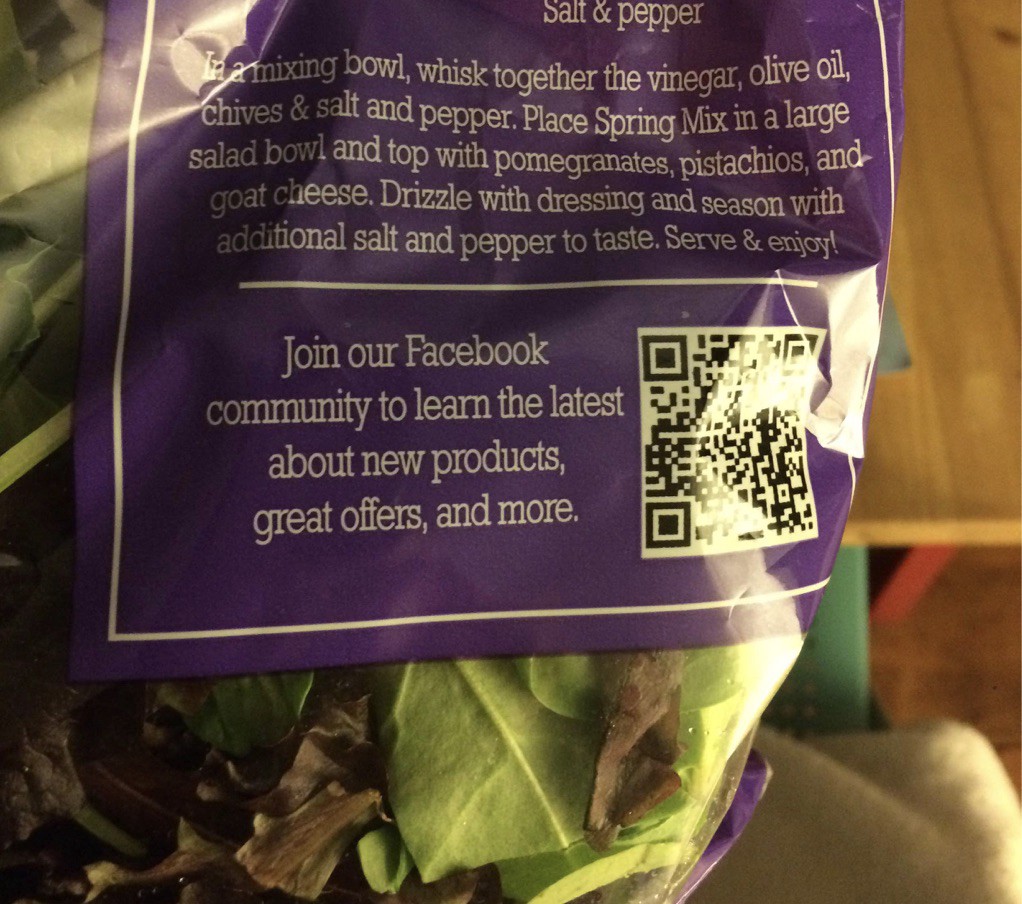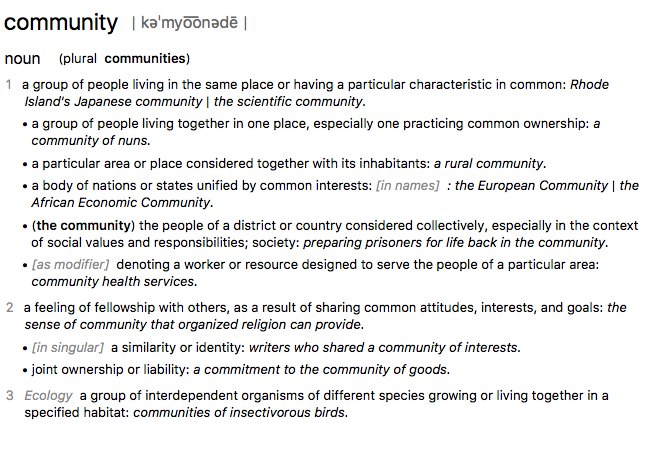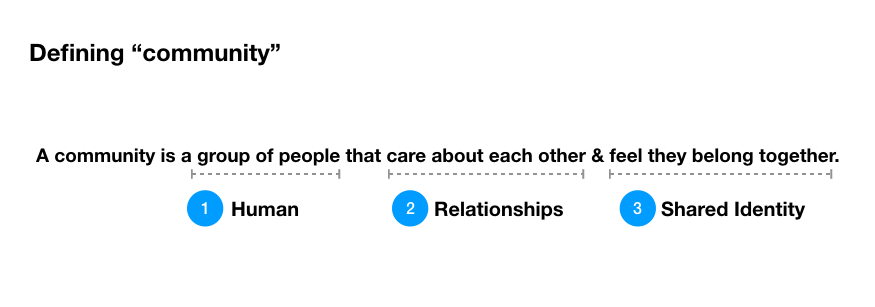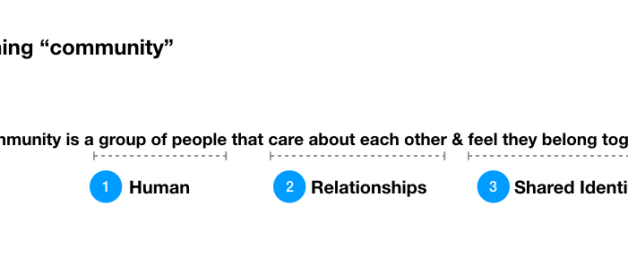 Salad community, anyone?
Salad community, anyone?
While shopping for groceries a few weeks ago, I picked up a pack of salad and flipped it around to learn about its origin. Immediately something caught my attention: my salad was inviting me to join its ?Facebook community?.
If even my salad has / is a community, what does ?community? even mean?!
?Community? has a definition problem
As someone who works with communities on a daily basis and has studied hundreds of them over the last couple of years, I sense a lot of confusion. The term is used as a catch-all phrase for anything that has to do with a collection of human beings, from the very tangible to the very abstract.
I see 2 problems:
1) Most ?communities? are not real communities
I get the sense that the term ?community? is really hot in the advertising/marketing/sales/startup/event space, because it alludes to more than just a transactional customer-company relationship. But most of the ?communities? I come across, are in my opinion not actual communities. I hear the word being used, when really the authors mean a series of monthly events, a Facebook page, a group of customers that has loyalty towards a specific brand, a yearly conference, all customers of an e-commerce brand, social media followers, everyone who uses Twitter, people who happen to vote the same way, etc.
2) The dictionary definition is vague and outdated
Here is how the dictionary defines ?community?:

I think the traditional definition of community is outdated. It is mostly based on shared location: ?a group of people living in the same place?. That?s what community used to be, historically. But for many of us, our village or neighborhood isn?t anymore our key definer of identity or fellowship. As this article in the Atlantic points out beautifully, we have shifted from, traditionally, being born into a community to, now, choosing our own communities and expressing our identities through them.
I think the traditional definition is missing a key piece. ?A feeling of fellowship with others, as a result of sharing common attitudes, interests and goals?: this part comes closer to modern forms of communities. Everyone in it has something in common. However, I think it?s too broad and vague. I have so, so many attitudes, interests and goals that I share with other people. But that doesn?t mean yet that I?ll feel a sense of community with them. For that, it needs relationships. More on this piece below.
We need to update what ?community? means
With the traditional definition being somewhat outdated and the term being used broadly by marketers, brands, entrepreneurs, event organizers, social media managers etc. in so many ways, I think we are missing out on the true power that ?real? communities can have.
We need to update what ?community? means in today?s world. And maybe we?ll have to find ways to differentiate between different kinds of communities. As there is no singular figure of authority in this space, I imagine this will best happen as a series of conversations among community builders. To kick off this conversation, I offer an attempt at defining ?community?:

Community = a group of people that care about each other and feel they belong together.
Let?s take that apart:
- ?A group of people?: in the end of the day, a community always exists of humans. That seems obvious at first, but I see a lot of use of the word that is dehumanized and abstract: ?the marketing community?, ?the international community?, ?the St. Clarke?s Streets community?, the ?AirBnB community?. In the end, we are talking about real humans with real lives, real stories, real hopes, real dreams.
- ?that care about each other?: this is in my opinion the absolute core of a community. The individuals in a group are not just random strangers, they have relationships with each other. They give a shit about each other. They care more about the people in this group than about the average person they meet on the street. This is where the magic of a community happens. When people care about each other, they develop trust. And trust unlocks collaboration, sharing, support, hope, safety and much more. While most organizations in the world optimize their performance towards external goals, communities optimize for trust.
- ?feel they belong?: communities address one of the most fundamental human needs: we want to be loved, we don?t want to be lonely and we want to know that we belong somewhere. Real communities give us this sense of home, this sense of family, this sense of ?these are my peers?. This is my tribe, this is where I belong. In this group, I am being accepted for who I really am.
- ?together?: a community gives people a sense of shared identity. We are together. The sum is bigger than the individual parts. This shared identity matters, because it takes the group beyond individual, 1:1 relationships. It turns strangers into trusted peers through a proxy effect: even though I don?t know you, I trust you more than the average person because we are part of the same community, we share the same identity. Many of us express our interests, ambitions and goals through the people we spend time with ? communities become part of our identity.
What about a community having a common goal / purpose?
I see a lot of community definitions that are a version of the following:
A community = a group of people that care about the same goal.
In my personal opinion, this definition does not qualify as a community, unless these people have trusted relationships with each other. Why? Because there are so many things in the world where people come together with a shared goal / purpose / attitudes / interests: project teams, companies, political movements, etc. They are groups of people that care about the same goal, but they are not communities.
I argue we need a way to differentiate those goal driven channels from groups that are heavily relationship based aka communities.
Why does this matter? It matters, because ultimately project teams, companies and political movements optimize for an external output (aka whatever their goal is). But communities, in my opinion, optimize for something else: the relationship and trust among themselves. I think the two entities have very different impact in the world.
Communities, of course, can still have shared goals as well. One way to look at that is to differentiate between the internal purpose of a community (we take care of each other) and the external purpose (we have a collective goal). I believe that every community needs to have an internal purpose first to truly function as a community. Without trust and relationships, it becomes a project, an initiative, a movement. But maybe communities with internal purpose are powerful channels to have external purpose?
How do YOU define ?community??
I?d love for this to be a conversation starter and would LOVE to hear what ?community? means to you. If you leave comments or message me, I?ll make sure to collect all the answers and report back. Thank you!
? ?
Looking for more community building resources?
More articles on community building
60+ articles on community building at https://medium.com/together-institute
Community Canvas
Check out the Community Canvas, the open-source tool we have created to support community builders across the globe and join our Community Builder Facebook group where we come together to share community relevant topics and learn from each other.
Community Building Newsletter
Every few weeks I send out a short email with 3?5 of my favorite insights, blog posts and articles about building meaningful communities. If you care about bringing people together, this might be for you. Sign up here.
Get in touch
Have thoughts and feedback on the writing above? Or are you looking for a speaker for your next event? I?d love to hear from you ? message me at [email protected] ? thank you!


